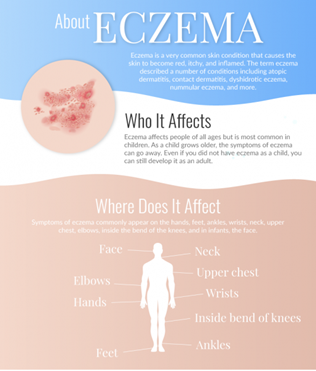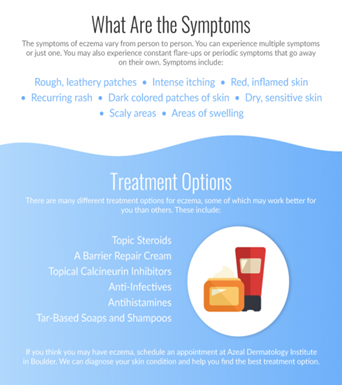

23rd September 2022 (6 Topics)
Context
According to a new study, a new drug has shown ‘significant’ improvement in moderate to severe eczema symptoms for patients between the age of six months and five years.
About
- Dupilumab, a biological drug, worked better than immune-suppressing medications.
- Dupilumab injection is in a class of medications called monoclonal antibodies. It works by stopping the action of certain substances in the body that cause inflammation
Eczema:
- Eczema, also known as atopic dermatitis, is a chronic inflammatory skin disorder characterised by red, dry, often oozing skin and itch that can profoundly affect the lives of affected patients and their families.
- An estimated 19 per cent or more of all children under 6 years of age have eczema. The onset of the disease for 85-90 per cent patients happens in the first five years of life.
- The children’s debilitating itch leads to sleep disturbance, poor neurocognitive development and, on average, a full night of sleep lost per week.
- Eczema is not contagious. The cause of eczema is unknown. It is likely caused by both genetic and environmental factors.
- Eczema may get better or worse over time, but it is often a long-lasting disease. People who have it may also develop hay fever and asthma.

Infant eczema symptoms
The following atopic dermatitis symptoms are common in babies under the age of 2:
- rashes on the scalp and cheeks
- rashes that bubble up before leaking fluid
- rashes that can cause extreme itchiness, which may interfere with sleeping
Symptoms of eczema include the following:
- Rough, leathery patches
- Intense itching
- Red, inflamed skin
- Recurring rash
- Dark colored patches of skin
- Dry, sensitive skin
- Scaly areas
- Areas of swelling

Treatments
- There is currently no cure for eczema. Treatment for the condition aims to heal the affected skin and prevent flares of symptoms.
- Doctors will suggest a treatment plan based on an individual’s age, symptoms, and current state of health.
- For some people, eczema goes away over time. For others, however, it is a lifelong condition.
Types
There are several types of eczema. Besides atopic dermatitis, other types include:
- Allergic contact dermatitis:This is a skin reaction that occurs following contact with a substance or allergen that the immune system recognizes as foreign.
- Dyshidrotic eczema:This refers to irritation of the skin on the palms of the hands and soles of the feet. It is characterized by blisters.
- Neurodermatitis:This leads to scaly patches of skin on the head, forearms, wrists, and lower legs. It occurs due to a localized itch, such as from an insect bite.
- Discoid eczema:Also known as nummular eczema, this type presents as circular patches of irritated skin that can be crusted, scaly, and itchy.
- Stasis dermatitis:This refers to skin irritation of the lower leg. It is usually related to circulatory problems.
More Articles


